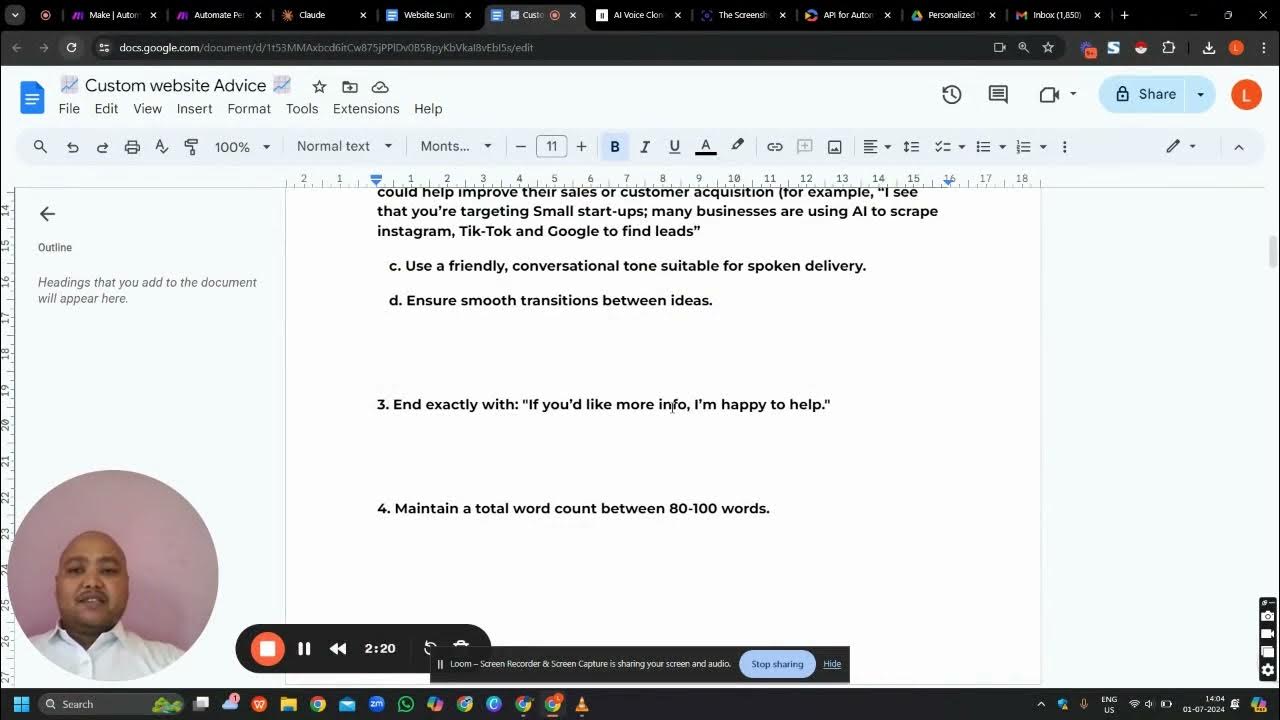Exploring how Salesforce's Einstein (Generative AI) works with Prompt Builder.
Summary
TLDRThis video script showcases Salesforce's integration of generative AI, Einstein, to enhance CRM data utilization for personalized outreach emails. It demonstrates how to create and customize prompts for AI to generate contextually rich and personalized content. The script addresses concerns about trust and customization, emphasizing the use of CRM data to ground prompts and ensure privacy within the Salesforce ecosystem.
Takeaways
- 📝 Salesforce integrates generative AI, like Einstein, to assist sales reps in creating personalized outreach emails.
- 🤖 The AI's effectiveness relies on the use of 'prompts', which are instructions or questions given to the AI to generate content.
- 🛠️ Prompt Builder in Salesforce allows customization of these prompts to tailor the AI's output to specific business needs.
- 🔍 A generic prompt may result in an impressive but unusable output due to the lack of context about the user, company, products, and customers.
- 🔄 Grounding the model involves embedding contextual information into the prompt to improve the AI's output relevance and personalization.
- 💬 The example shows embedding the customer's name from the CRM into the prompt to make the AI's response more personalized.
- 📑 CRM data can be leveraged to enrich prompts, including product focus and customer-specific information, to achieve a more grounded and contextual result.
- 🔄 Flows can be embedded within prompts to make them dynamic and reactive to each customer's unique situation.
- 💰 Conditional context, such as a customer's tier level which might qualify them for a discount, can be integrated into prompts for tailored offers.
- 🔒 Salesforce ensures that all private data used for AI-generated content stays within the Salesforce trust boundary and is not used to enhance other results.
- 🔄 The process of creating a grounded prompt using CRM data and integrating AI-generated personalized results enriches the product experience for customers.
Q & A
What is the main purpose of using generative AI in Salesforce's contact records?
-The main purpose is to enable sales reps to draft personalized outreach emails using the data in CRMs, enhancing the customization and personalization of communication with customers.
What is Einstein in the context of Salesforce?
-Einstein is Salesforce's suite of AI-powered services that is built into the platform to assist with tasks such as email drafting, leveraging generative AI capabilities.
What is a 'prompt' in the context of generative AI?
-A 'prompt' is a question or instruction given to an AI system, guiding it to generate a specific type of content or response, such as an outreach email.
Why might a generic prompt result in an unusable output?
-A generic prompt may result in an unusable output because it lacks the necessary context about the user, their company, products, and customers, leading to a response that is too broad and not personalized.
How can the AI model be 'grounded' to improve the quality of the generated content?
-The AI model can be grounded by embedding context about the user's goals and specific details from the CRM into the prompt, which helps the AI generate more relevant and personalized content.
What is the role of the CRM in creating a grounded prompt?
-The CRM provides the necessary data about the user, their company, products, and customers, which is then embedded into the prompt to create a grounded context for the AI to generate personalized content.
Can the prompts be customized differently for different customers?
-Yes, prompts can be embedded with dynamic elements or flows that adjust based on customer-specific data, allowing for personalized and contextually relevant responses.
What is the significance of the 'gold tier customer' in the script?
-The 'gold tier customer' signifies a high-value customer segment that may qualify for special offers or discounts, such as a 10% discount mentioned in the script, which can be factored into the personalized prompts.
How does Salesforce ensure the privacy of data used in generating AI results?
-Salesforce ensures privacy by maintaining all data within the Salesforce trust boundary and not storing it outside of it. The data is also not used to enhance any results other than those of the user's own.
What is the final outcome of integrating generative AI with CRM data in Salesforce?
-The final outcome is the creation of rich, personalized results that are seamlessly integrated into the product experience, allowing for more effective and customized outreach to customers.
Outlines

This section is available to paid users only. Please upgrade to access this part.
Upgrade NowMindmap

This section is available to paid users only. Please upgrade to access this part.
Upgrade NowKeywords

This section is available to paid users only. Please upgrade to access this part.
Upgrade NowHighlights

This section is available to paid users only. Please upgrade to access this part.
Upgrade NowTranscripts

This section is available to paid users only. Please upgrade to access this part.
Upgrade NowBrowse More Related Video

Connect With Customers in a Whole New Way With the #1 AI CRM | Salesforce Customer 360 Overview Demo

What is Salesforce? | Salesforce Explained

Top 5 BEST CRM For Small Business (2024) | Best Picks Reviewed!

I Built Alex Hormozi’s $100M Lead System with AI

Writer CEO: Bringing AI and People Together

🚀 Cracking AI Text to Video for Automated Outreach! 🚀
5.0 / 5 (0 votes)